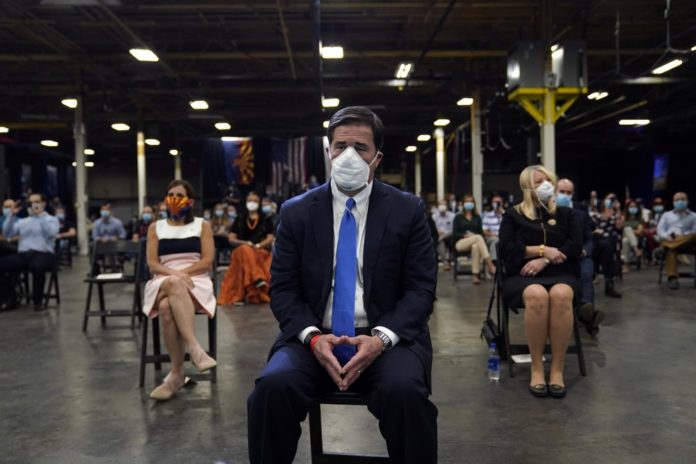
In the early months of the coronavirus pandemic, Arizona officials bought more than $59 million worth of masks, gowns, gloves and other personal protective equipment intended for hospital employees and other frontline workers.
Cost didn’t seem to be their top concern — they needed the supplies.
That’s clear from purchase data obtained by The Associated Press, which shows a widely varying range of prices paid for large stocks of personal protective equipment. The Health Services Department bought from longtime medical suppliers and companies that popped up almost overnight.
Some of the largest state purchases were for N95 masks, which filter fine particles and are the standard equipment for health care workers who are regularly exposed to the virus.
Arizona bought nearly 20 million N95 masks, many for quick shipment but others on long-term order. One of the orders was from Honeywell International, which set up a factory in Phoenix to help meet the nationwide shortage.
Arizona got a relatively good deal from Honeywell, paying 78 cents each on April 28 for more than 6 million masks it will receive over a 12-month period. Other deals weren’t so sweet for the taxpayer: The state paid one company, Mesa-based Odyssey Global, $5.43 each for a shipment of 368,000 N95 masks. Total cost: Nearly $2 million. The Honeywell deal for 6.4 million masks cost $5 million.
Health Services spokeswoman Holly Poynter said the wide variation in price was caused by a global run on protective gear early in the pandemic. The competition led to restricted supplies and fluctuating delivery timetables.
“While prices varied for PPE, the primary objective of the department was to ensure we sourced critical PPE to meet our immediate and long term needs in Arizona,” Poynter said in written responses to questions from the AP.
Across the nation, the AP tallied more than $7 billion in coronavirus purchases by states this spring for personal protective equipment and high-demand medical devices such as ventilators and infrared thermometers. The data covers the period from the emergence of COVID-19 in the U.S. in early 2020 to the start of summer.
The AP’s data, obtained through open records requests, is the most comprehensive accounting to date of how much states were buying, what they were spending and the vendors they were paying during a chaotic spring when inadequate national stockpiles left state governments scrambling for hard-to-get supplies. States were competing against each other, hospitals, the federal government, and even other countries. In many cases, they suspended normal competitive bidding requirements.
The data shows a sharp increase in personal protective equipment prices as the virus began spreading throughout the country. Before the pandemic, an N95 mask that filters out tiny particles might have cost around 50 cents. This spring, states paid an average of $3 for each N95, according to the AP’s analysis, and some paid more than $10 per mask to get them quickly.
The AP’s data also shows that millions of dollars flowed from states to businesses that had never before sold personal protective equipment.
In Arizona, regular suppliers were unable to provide the needed equipment, forcing the state to find alternative sources on the fly. Poynter said they were all vetted to ensure they were legitimate, and so far none have failed to deliver.
Republished with the permission of the Associated Press.














